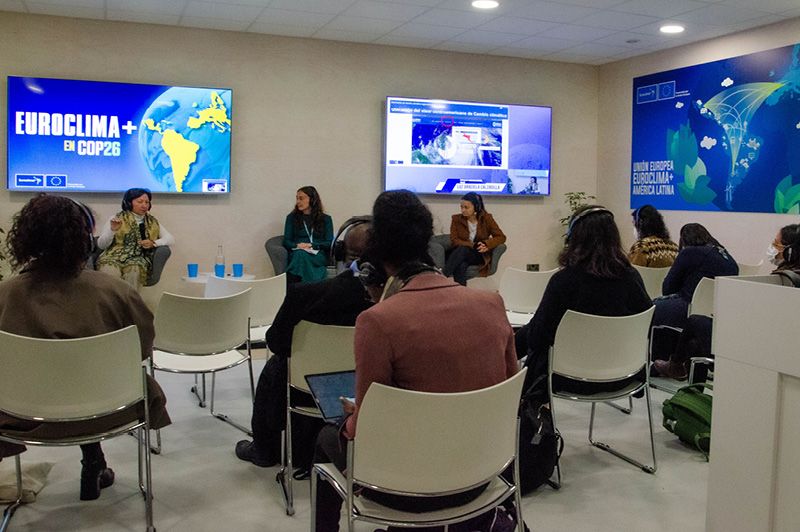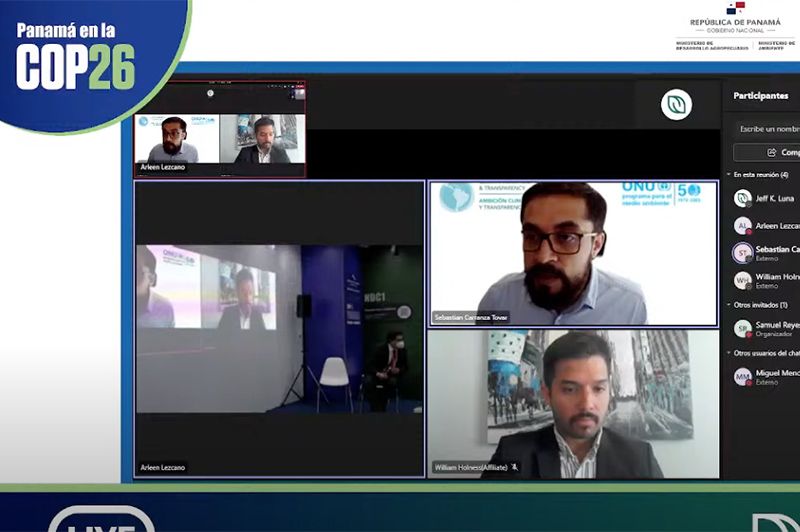The health and economic crisis generated by COVID19 brought new challenges at the political level, challenges that must now be aligned with countries' climate goals.
Monitoring and evaluating progress on Nationally Determined Contributions (NDCs) is a major challenge for Latin America. Therefore, in the framework of COP26, EUROCLIMA+ promoted high-level dialogue to increase transparency and climate ambition in the region.
To comply with the Paris Agreement, several countries need to develop integrated monitoring and evaluation systems for their climate policies, to foster transparency and accountability under the Paris reporting requirements. Improved M&E systems have the potential to support informed decision-making and the implementation of policies based on information.
The health and economic crisis generated by COVID19 brought new challenges in terms of the follow-up of policies and actions to be undertaken in the framework of a sustainable, resilient and inclusive recovery. Recovery policies must be aligned with countries' climate goals.
In this regard, EUROCLIMA+ supports the dialogue and strengthening of Latin American countries' tools to ensure transparency and the ambition of the NDCs followed by their achievement through long-term policies and strategies.
The transparency applied to market-based instruments and cooperative approaches to the Paris Agreement
"In developing countries, there are common gaps in institutional capacities for the preparation of Biennial Transparency Reports (BTRs) to the UNFCCC...Among them is the need to strengthen climate information systems for the Monitoring, Reporting and Verification (MRV) of mitigation actions, as well as the Measurement and Evaluation (M&E) of adaptation actions, in this regard it is necessary to increase capacities for the management and analysis of data related to the monitoring and achievement of climate goals."
William Holness, UNEP
The main objective of this event was to generate an informed dialogue on transparency challenges extended to market-based instruments and Article 6 cooperative approaches in the context of developing countries. This dialogue was aimed at promoting greater commitment by parties in the development of their instruments and regulations for compliance with the Paris Agreement.
At this event, experiences from countries in the Latin American and Caribbean region on the use of market-based instruments and cooperative approaches as tools for the fulfilment of their NDCs were exchanged.
This event is linked to the UNEP area which, through the EUROCLIMA+ Programme, works to promote its perspectives on transparency applied to environmental integrity and additionality of mitigation outcomes, in order to make available to countries in the region the tools and collaborative initiatives that can promote ambition in climate action.
Climate information viewers for adaptation to climate change
For climate change adaptation policies to be effective, they require information and data that generate good foresight: possible scenarios based on the different possible paths of global emissions. But they also need to be accurate, adapted to the specific local context so that plans and infrastructures are designed according to the most likely reality. This is the direction of the regionalisation of climate scenarios, which the EUROCLIMA+ programme has been supporting in several countries in the region, with the collaboration of other public institutions and cooperation with national meteorological services.

The meeting Climate information viewers for climate change adaptation, held during COP26 at the EUROCLIMA+ pavilion, brought the complexity of these projections closer to the reality of climate policies. During the meeting, the experiences of the IPCC Interactive Atlas, the AdapteCCa viewer (Spain) and the Climate Change Scenarios viewer (generated in the framework of EUROCLIMA+) were presented as tools for visualising future climate data and scenarios. Undoubtedly, these tools are of great value when designing the future adaptation of countries to climate change, but also inspiring experiences for other countries that are currently exploring these applications. The event allowed the exchange of experiences from Ecuador, with the development of a geo-viewer of climate scenarios and risks that is being supported by EUROCLIMA+, and Chile, which has developed a climate risk atlas, in the generation of tools that include key information on climate risks and their role in the planning of adaptation measures.
Joint decisions for transparency
In order to consolidate a green transition, it is necessary to create joint decision-making spaces in which communities, institutions and authorities reach joint agreements, recognising the context, the diagnosis and the territory in which the initiatives to address climate change are implemented.
During the discussion ‘The social inclusion of indigenous and rural communities for the success of public policies for adaptation to climate change’, the EUROCLIMA+ Urban Water and Risk Management sectors presented the climate observation stations implemented in Central America by the Humboldt Centre Nicaragua, through which rural communities were involved and trained to observe climate phenomena and generate early warnings, merging both the knowledge of the communities and scientific knowledge. This generates a community dialogue on climate, where everyone participates and contributes to addressing climate change and consolidating more resilient territories.
"The climate has a lot of variability, it is not in one direction. That's why these stations were set up, they help us a lot as producers, we get a lot of guidance with these stations, and we look together at what we can sow and what we cannot".
-Sandra Centeno, participant in the initiative.
It is in these spaces of joint decision-making that new links are generated between the rural and urban population, as in the case of the Water for Abancay project of EUROCLIMA+ Water, in the Micaela Bastidas community. The restoration of ecosystems has also meant transforming dynamics in the community: "We help each other, they help economically, they don't lack water in the village and we also have enough water in the community", says Angélica Mozón, a community leader.
"Environmental degradation can also lead to community deterioration, but at the same time, the restoration of ecosystems can also re-establish community ties".
-Vincent Merme, Technical Assistance to the French Development Agency.
About EUROCLIMA+
EUROCLIMA+ is a programme funded by the European Union and co-financed by the German federal government through the Federal Ministry for Economic Cooperation and Development (BMZ), as well as by the governments of France and Spain through the Ministry of Foreign Affairs, European Union and Cooperation.
The Programme's mission is to reduce the impact of climate change and its effects in 18 countries of Latin America and the Caribbean, promoting mitigation, adaptation, resilience and climate investment. It is implemented according to the "Spirit of Team Europe" under the synergistic work of seven agencies: the Spanish Agency for International Development Cooperation (AECID), the French Development Agency (AFD), the Economic Commission for Latin America and the Caribbean (ECLAC), Expertise France (EF), the International and Ibero-America Foundation for Administration and Public Policy (FIIAPP), the German Society for International Cooperation (GIZ) GmbH, and the UN Environment Programme (UNEP).
More information:
Sofia Alarcon, UNEP: This email address is being protected from spambots. You need JavaScript enabled to view it.
Daniel Fernández, FIIAPP: This email address is being protected from spambots. You need JavaScript enabled to view it.
Guiby Vargas, AECID: This email address is being protected from spambots. You need JavaScript enabled to view it.
Alexandra Cortés, EUROCLIMA+ Programme Secretariat: This email address is being protected from spambots. You need JavaScript enabled to view it.

